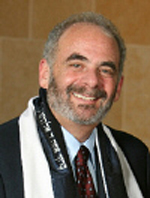By Rabbi Michael Berk
Times of San Diego

SAN DIEGO — As I write these words the presidential campaign, mercifully, is winding down. The ugliest, most unseemly, undignified, and dispiriting campaign in my lifetime is finally laid to rest. David Horovitz, editor of Times of Israel, says we have watched “…a great democracy being battered before our eyes — watching a contest for the presidency being waged without mercy and without respect, with norms and limits flouted, propriety and decency trampled.”
The question now is, will our new President be able to govern? Will Donald Trump help us put aside the vitriol and bitterness and unite us in common purpose to address the issues that cry out for attention? Will our leaders exercise grace, creativity, compassion, and intelligence; and actually heal our nation?
Our new president can learn something about leadership from the Torah, which Christians also share as the first five books of the Hebrew Bible. If President Trump, who has Jewish grandchildren, studies the Torah, what will he learn about the Bible’s view of leadership?
The notion of a king for Israel is not mentioned until the speeches Moses delivers in the last book of the Torah. Moses prophesied that the Israelites will find a problem with their leadership that God does not share: the lack of a human king to rule over them — a king like the other nations have.
The Bible recognizes why people want a strong ruler — fear. Thomas Hobbes said that if people’s fears are calmed a society can function. But the Torah knows how fear can lead people to a willingness to accept leadership that is strong but is also corrupt. Deuteronomy provides a new way to use power to calm the natural fears that people have.
It’s not clear that the king was supposed to do much at all. Rather than outline the king’s authority, the Torah focuses on his restrictions: In the ancient world international alliances were created through marriage. So, the number of wives he will be permitted is limited to reduce foreign entanglements. To restrain military expansion, the king will be limited on how many horses he may have. And restricting the amount of gold he amasses was a way to constrain the kings’ power of taxation.
Oddly, Torah is silent about what the Israelites were obligated to do for the king. The authority of the King in the ancient world was often based on the god telling the king his people must obey him. When the Torah describes judges or prophets, it says you have to obey them. But never are the Jews told they have to obey their king! This is revolutionary. The Jewish King is controlled by Torah but Torah doesn’t say the Jews were to be controlled by their king. Sounds awfully Jewish, doesn’t it?
There’s only one thing the king is clearly tasked with doing: He has to read and write a book. Most of our commentators assume this refers to the book of Deuteronomy. He writes it in front of the priests. He is not part of the religious establishment and has no religious power. He reads and writes this book all the days of his life to remind himself that he is not above the law; that he has to obey the law.
Moses knows the people will ask for a king. They will get one, but they get a king with a Jewish understanding of power. They want a king that controls everything, but get a king who has little of what is normally understood as power.
The Bible is searching for a kind of ruler different than the other rulers in the world. Instead of absolute kingly power as exercised by other rulers to give people security and quiet their fears, the Torah creates a different kind of monarchy that will pursue justice and wisdom, and with those tools, create peace and calm and righteousness in the nation.
So who is the Jewish king? Achicha– your brother. Other rulers were referred to in paternal terms, like Founding Father. In Israel, the king is your “brother,” and, by the way, so is the slave!
Ours is a vastly different world than the one Moses knew. But it is still a frightening world and this last election especially was so much about fear. I hope that our new President Trump will seek to calm the raging fears that animated our presidential campaign with wisdom and modesty, with honesty and openness, recognizing that he is one of us — our brother.
Michael Berk is the senior rabbi of Congregation Beth Israel, the largest Jewish congregation in San Diego and the oldest in Southern California. Times of San Diego shared this article as a member of the San Diego Online News Association.